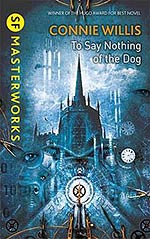
![]() ParallelWorlds
ParallelWorlds
8/3/2013
![]()
Intended Audience: Adult
Sexual content: None
Ace/Genderqueer characters: ?
Rating: PG
Writing style: 4/5
Likable characters: 5/5
Plot/Concepts: 3/5
In Ned Henry's day, historians are very much involved in time travel, but unfortunately their main source of funding happens to be a tyrannical woman who is obsessed with renovating Coventry Cathedral. Lady Schrapnell will stop at nothing to find the bishop's bird stump, a particularly ugly metal urn, and Ned has been coerced into making more time-jumps than is healthy.
So what is the cure for time-lag? A long break from changing time periods, hopefully far away from where Lady Schrapnell can order him around. Summer of 1888 in Victorian England, for example. But Ned isn't about to get much rest, because it seems an incongruity has happened due to a certain fellow historian saving a drowning cat. Now Ned and Verity (the cat-rescuer) must try to correct all the impossible details of the timeline—if they don't, marriages may never have happened, children may not have been born and grown up to fight in wars which may not have been won after all.
If you couldn't tell already, I found this book delightful and really entertaining. The beginning was the type that dumps the reader right into the middle of things without explaining much, so that was annoying at first. We never get a detailed explanation of a lot of things which seem important. For example, why exactly does everybody obey Lady Schrapnell's outrageous demands? Why is the bishop's bird stump so important? Small reasons are tossed out here and there but nothing I thought satisfactory. Still, once the story got going I was too amused by the characters and situational comedy to mind.
Willis really brings a sense of the chaos and silliness of everyday life to this tale, as well as drawing references to well-known and classic written works from various time periods. Each of the characters is distinct and I ended up a little fond of all of them by the end, even Lady Schrapnell in some strange way. Although there are elements of caricature (unsurprising as this adds to the comedic effect), there is still a sense of realism to each person's motivations. And best of all, I loved that Ned is never presented as being more important or more capable than Verity. They are pretty much equal in all respects, and sometimes Verity is much farther ahead of Ned by virtue of having been prepped more effectively for the mission. Although they are forced into particular gender roles due to the time periods they live in, I don't get the impression that either of them is overly concerned with matters of masculinity or femininity. Neither one looks down on the other and watching their friendship grow naturally throughout the course of the story was really wonderful.
I also greatly enjoyed the fact that the servant characters and even the animals were treated as real characters, not just background objects. In fact the butler, Baine, and the dog and cat are some of my favorites, and they end up playing huge roles in the progression of the plot. There is only one person of color mentioned, but he is shown to be an extremely capable and intelligent person, so at least there's that. In addition, although there was a lot of pairing up of characters and old-timey romance involved, there was virtually no sexual content. Perhaps this is due to the setting (which mostly takes place in Victorian England, famous for sexual repression), but it also makes it easy to read a lot of the characters as being asexual if one wishes. For example, the author could have chosen to describe Ned and Verity's attraction to one another in more sexual terms since they are both from the future where such things are openly discussed, but she didn't. She left it to the imagination of the reader, which I believe makes it enjoyable to a wider audience.
This is the kind of charming adventure story I have always loved. It's not without danger, but violence or romance or sex or explosions are not at all the focus, which leaves a lot of room for pure fun. The fate of the world still hangs in the balance, but the devil is in the details of seemingly inconsequential actions and events. The world isn't saved by blowing up buildings or assassinating someone or some other drastic move, but by being in the right (or wrong) place at the right (or wrong) time. There is a particularly thrilling scene during an air raid, complete with collapsing buildings, so if you're into that kind of thing, there's something for you too. I just appreciate the skill of an author who can make things entertaining without much fanfare.
I only gave the Plot/Concepts portion a 3/5 mainly due to how confusing certain elements of its execution were. Admittedly, it's hard to avoid that sort of confusion when dealing with time travel stories, and by the last page I finally had a vague idea of how it had all worked out, but there were a lot of places where my faith in it all making sense was wavering. And, as mentioned before, some questions were never quite answered to my satisfaction. Still, there was obviously a lot of thought put into how it would all play out, and juggling all those tiny little events and consequences, actions and reactions, must have been very difficult, especially when it all had to tie together. So it's almost a 4/5, but not quite.
If you're looking for a book that will make you smile and transport you to another world, check out To Say Nothing of the Dog at your local bookstore or library! I look forward to reading more of Connie Willis in the future.
http://www.parallelworldsmagazine.com